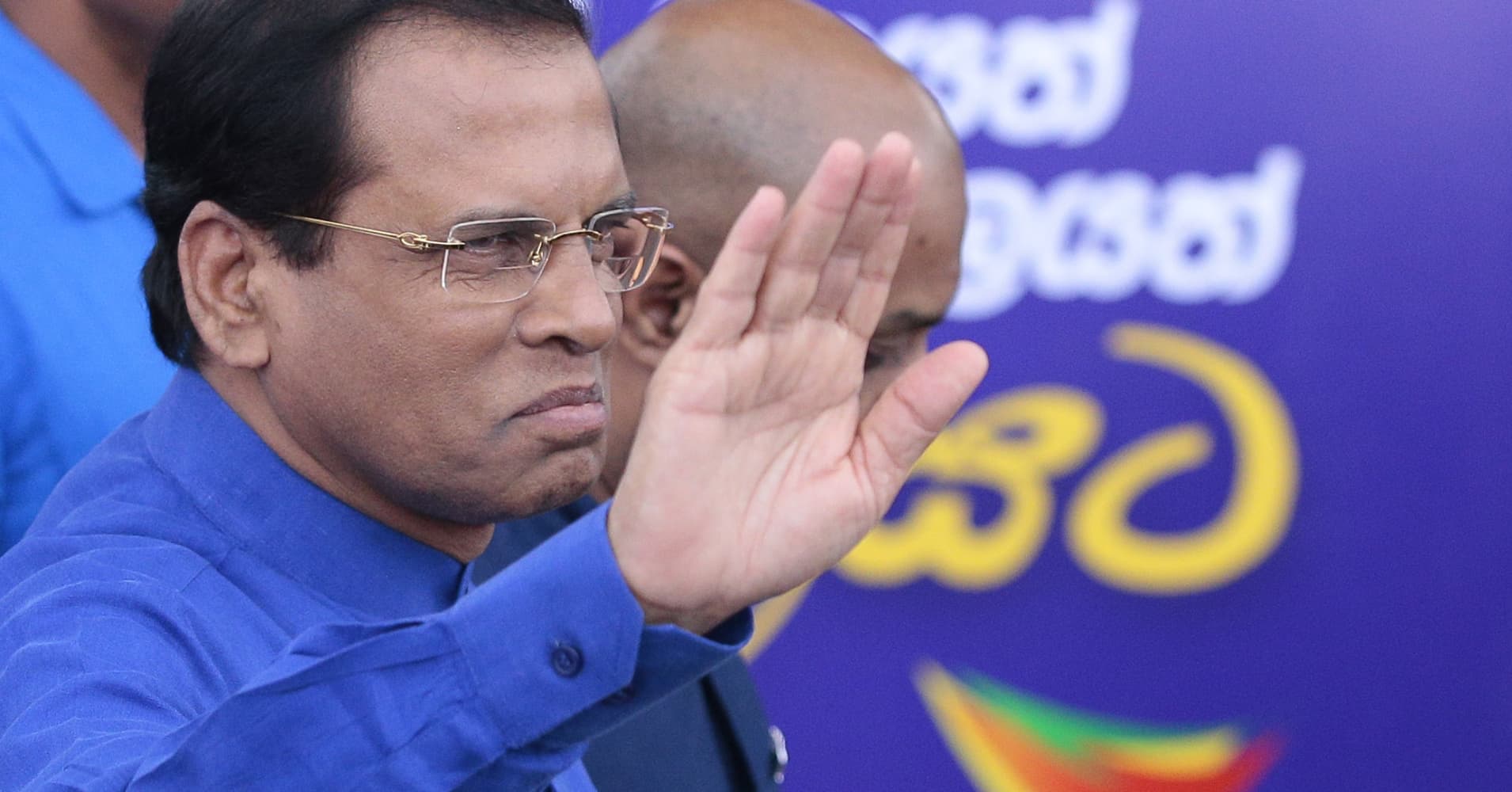
A political crisis in Sri Lanka took a deadly turn on Sunday, with one person killed when a sacked cabinet minister tried to re-enter his office, days after the president removed the prime minister and installed a powerful ally of China in his place.
Sri Lanka has been plunged into crisis since Friday, when President Maithripala Sirisena abruptly sacked Prime Minister Ranil Wickremesinghe and swore in ex-president Mahinda Rajapaksa as the new prime minister to replace him.
Sirisena said the move was motivated by a plot to kill him, and by economic collapse. Wickremesinghe says it was illegal and he is still prime minister. Rajapaksa ruled as president from 2005-2015. In a statement released late on Sunday, he pledged to "eschew the politics of hate and set up an interim government that will protect the human rights of all citizens, that will protect the independence of the judiciary and establish law and order."
He called on lawmakers to support his new government.
On Saturday, Sirisena suspended parliament until Nov. 16, a move the ousted prime minister's supporters say was intended to prevent lawmakers from showing support for Wickremesinghe.
The standoff has important geopolitical implications in a country long influenced by its neighbor India, and which became massively indebted to China to finance huge infrastructure projects during Rajapaksa's decade as president.
Most of Sri Lanka's foreign allies including India, the European Union and the United States, have urged Sirisena to abide by the constitution. But China, long seen as a supporter of Rajapaksa, congratulated him on becoming prime minister, drawing accusations from Wickremesinghe's supporters that Beijing was behind the attempt to change the government. Chinese officials deny interfering in Sri Lanka's affairs.
The U.S. State Department on Sunday urged all sides to refrain from violence and called on Sirisena to immediately reconvene parliament and "allow the democratically elected representatives of the Sri Lankan people to fulfill their responsibility to affirm who will lead their government."
Since Rajapaksa was sworn in, trade unions allied to him have blocked government buildings to prevent members of the former cabinet from reaching their offices.
Sunday's violence took place at the headquarters of state oil company Ceylon Petroleum, where Arjuna Ranatunga, petroleum minister in the ousted cabinet, tried to re-enter his office. Police said one of Ranatunga's security guards opened fire. One person was killed and two wounded.
The guard had been arrested and an investigation launched, police spokesman Ruwan Gunasekera said. Ranatunga was safe and the security guard's motive was not immediately clear, he added.
Local media said Ranatunga had briefly been held hostage in the office.
Reuters was not immediately able to confirm details of the incident.
U.N. Secretary-General António Guterres called on the Sri Lankan government to respect democratic values and constitutional provisions and process, uphold the rule of law and ensure the safety and security of all Sri Lankans.
So far, a majority of lawmakers has not endorsed Rajapaksa. In a letter sent on Sunday, parliament speaker Karu Jayasuriya urged the president to protect Wickremesinghe's rights and privileges "until any other person emerges from within the Parliament as having secure confidence of the Parliament".
In an address to the nation, Sirisena said his action to change the government was "totally in accordance with the constitution and on the advice of legal experts".
The Rajapaksa faction has sought to win over lawmakers to back it in parliament. Two Wickremesinghe loyalists have pledged support to Rajapaksa and sources close to Rajapaksa have said there will be more cross-overs.
Ranjan Ramanayake, a legislator from Wickremesinghe's United National Party (UNP), said some lawmakers had been offered up to $4.6 million each to switch sides and support Rajapaksa. Reuters was unable to confirm this.
"This is an international conspiracy," Ramanayake told reporters at Wickremesinghe's official residence, accusing China of "spending money to buy over members".
A Chinese embassy official in Colombo denied the allegation and said Beijing maintained good relations with all Sri Lankan parties, including the UNP.
"China never interferes in other countries' internal affairs," the official told Reuters. "We're against all this interference from any foreign country."
Cheng Xueyuan, China's envoy to Sri Lanka, met Rajapaksa with a congratulatory message on Saturday. The embassy official said the ambassador had also met Wickremesinghe and speaker Jayasuriya.
India and Western countries have concerns about Rajapaksa's ties to China, after he ushered in billions of dollars of investment from Beijing to rebuild the country following the end of a 26-year war against Tamil separatists in 2009.
That investment has since put the tiny nation deep in debt and forced it to hand over control of a strategic port to China.
"As a democracy and a close friendly neighbor, we hope that democratic values and the constitutional process will be respected," said Raveesh Kumar, spokesman for India's Ministry of External Affairs. "We will continue to extend our developmental assistance to the friendly people of Sri Lanka."
No comments:
Post a Comment